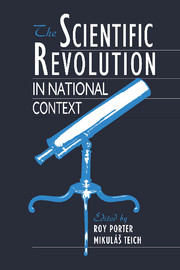Book contents
- Frontmatter
- Contents
- Notes on contributors
- Acknowledgements
- Introduction
- 1 Scientific Revolution, social bricolage, and etiquette
- 2 The Scientific Revolution in France
- 3 The Scientific Revolution in the German Nations
- 4 The new philosophy in the Low Countries
- 5 The Scientific Revolution in Poland
- 6 The Scientific Revolution in Spain and Portugal
- 7 The Scientific Revolution in England
- 8 The Scientific Revolution in Bohemia
- 9 Instituting science in Sweden
- 10 The Scientific Revolution in Scotland
- Index
2 - The Scientific Revolution in France
Published online by Cambridge University Press: 05 June 2012
- Frontmatter
- Contents
- Notes on contributors
- Acknowledgements
- Introduction
- 1 Scientific Revolution, social bricolage, and etiquette
- 2 The Scientific Revolution in France
- 3 The Scientific Revolution in the German Nations
- 4 The new philosophy in the Low Countries
- 5 The Scientific Revolution in Poland
- 6 The Scientific Revolution in Spain and Portugal
- 7 The Scientific Revolution in England
- 8 The Scientific Revolution in Bohemia
- 9 Instituting science in Sweden
- 10 The Scientific Revolution in Scotland
- Index
Summary
THE AGE OF THE UNIVERSITY
in the second half of the sixteenth and in the early seventeenth centuries the large majority of the French social and cultural elite showed scant interest in unravelling nature's secrets. The socially dominant noblesse d'épée seldom received a sophisticated education in the classical humanities and philosophy and often could read no other language but French. Their physically exacting existence left little time to contemplate God's creation and the few who did so found a soldier's comfort in the sceptical wisdom of Montaigne. The highly-educated members of the liberal professions, on the other hand, had usually studied natural philosophy as part of their professional training. But they too showed little interest in later life in gaining a fuller acquaintance with the natural world. Although many clerics and lawyers were extraordinarily learned, by and large their erudition was focused on the burning religious and political problems of the day, not on the mysteries of nature. Even medical physicians paid scant attention to the philosophy of nature on which their professional activities were supposedly based. Whatever they might claim, the majority were empirical practitioners.
Apart from the odd figure at court the only Frenchmen who had more than a passing interest in the science of nature in the era of the Wars of Religion were likely to be professors of philosophy and medicine. In their case they had little choice, for physics or natural philosophy was part of their teaching brief.
- Type
- Chapter
- Information
- The Scientific Revolution in National Context , pp. 55 - 89Publisher: Cambridge University PressPrint publication year: 1992
- 11
- Cited by



